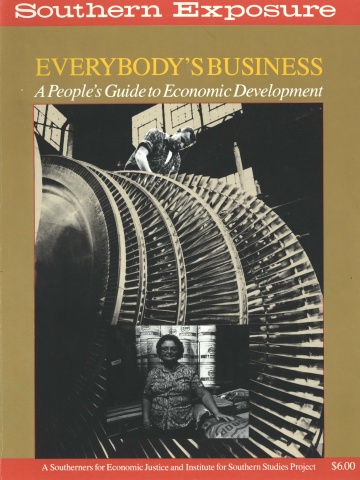
This article originally appeared in Southern Exposure Vol. 14 No. 5/6, "Everybody's Business." Find more from that issue here.
One of the key places in a community where people can get started acting locally on economic justice and development issues is the congregation. There's a tremendous potential for making things happen when dozens or hundreds of people gather each week to reflect on questions of how to live their daily lives in light of their faith.
Congregations are by definition local, but it's not always easy for them to act locally. Sometimes it's difficult to step through the church doors into the community, especially when it seems to take all a congregation's energy just to keep going, just to keep the heat on and the salaries paid. Other congregations might find that their physical location bears little relation to where their members live. And for congregations blessed with many resources, located in economically well-off communities, there may seem to be little need to act locally on the economic front. But it is usually a simple matter to find a distressed congregation or community nearby and to form an alliance with the people there who can use your resources and experience.
The challenge — and the opportunity — is to rediscover and enhance a congregation's locality through community economic development. CED does take time and effort, but it can also bring a unifying focus to a variety of congregational interests. It can be a revitalizing experience, as many congregations have discovered. And it can mean a renewed sense of mission, new members, and a new effectiveness in addressing basic problems in the community — instead of just dealing with symptoms.
Congregations can also offer a resource that is in very short supply in distressed communities: hope and faith in one's ability to make a difference. All this may sound like yet another program to squeeze into an already crowded agenda, but in many ways CED involves looking at existing programs in a new way, and getting more out of them in the process. In addition to supporting the food pantry, for instance, congregations might work with a local community development corporation to create new jobs, thus reducing the need for emergency food. Instead of giving to the United Way, a congregation might put its financial resources into a Buy Local campaign that has much more neighborhood impact.
Every congregation is unique. Every community has its own peculiar tastes. So there is no one recipe for community economic development. Each community has to cook up its own, based on its special set of ingredients — enthusiasm, skills, money, people. What follows is a list of some of the many programs that congregations, community-based organizations, and coalitions have done to promote community economic development. Most of these programs require a variety of approaches, from hands-on work in a neighborhood to lobbying policymakers to publicity and fundraising assistance. It might be helpful to keep a pencil in hand to mark the ideas that look right for your congregation.
Housing — A Bed for the Homeless, or a Better Roof
Housing programs are one of the most visible and widespread examples of congregations and community groups intervening in the local economy:
□ Housing cooperative
□ Housing rehabilitation
□ New construction by a non-profit developer
□ Shelter for homeless or battered women
□ Transitional housing
□ Single-room occupancy residences
□ Involvement with a national housing group
□ Tenants' rights advocacy and organization
□ Abandoned housing cleanup and prevention
□ Property management services
□ Tool loan programs
□ Emergency home repair
□ Weatherization
□ Sweat equity/volunteer building program
Job Development — Making More Paychecks
Experienced groups often take the bull by the horns and work directly on creating new jobs, often by working with for-profit businesses or with non-profit development corporations:
□ Community-owned business
□ Worker cooperative
□ Worker buy-out of a business or plant
□ Enterprise development for targeted group (for example, low-income women or youth)
□ Craft cooperative
□ Certified community development corporation
□ Support of entrepreneurs through a business incubator, auxiliary services, and technical assistance
□ Early warning system to identify businesses about to close or move
□ Support of business development/retention
□ Commercial strip development
□ Opposition to inappropriate business activity or development
Purchasing and Investing — Make Each Dollar Count
Where and how you spend your dollars can make a big difference:
□ Purchase goods or services from small businesses, minority enterprises, and worker co-ops
□ Make purchases which support workers in third world countries; for example, coffee from Nicaragua or crafts from "Pueblo to People"
□ Boycott companies which contribute to unjust economic or labor practices (contact the Interfaith Center on Corporate Responsibility at 475 Riverside Dr., New York, NY 10115 for information)
□ Provide consumer counseling or education on home ownership/maintenance, nutrition, budgeting, tax preparation, etc.
□ Start a "Buy Local" campaign
□ Do banking business at community-oriented bank
□ Don't do business with banks making loans to South Africa, Chile, etc.
□ Encourage socially responsible investments, such as through the Calvert Fund, Working Assets, or a progressive credit union
□ Support an alternative community loan fund
□ Use community credit union
□ Set up emergency loan fund for housing repair, etc.
□ Participate in stockholder resolutions
□ Establish loan guarantee programs
□ Use church/religious community pension funds to support CED project
Food and Farming — Flow of Food Is Part of the Economy
□ Food pantry/bank
□ Food-buying club
□ Food stamp rights and education
□ Share Food program
□ Community garden
□ Farmers' market
□ Cooperative marketing of farm products
□ Finding new markets for farm products, including organic foods
□ Advocacy and support group for distressed farmers
□ Farmers Home Administration (FMHA) borrowers' rights education
□ Loan guarantee assistance for farmers
□ Locating outside investors for family farms
□ Cooperative assistance for family farmers unable to hire workers: volunteers
Job Training and the Unemployed — A New Start
In communities where old skills are no longer needed, or where the unemployed have few skills to offer, job training and counseling may be the best place to start:
□ Job support group
□ Counseling for unemployed workers
□ Job linkage
□ Job retraining
□ Displaced workers program
□ Skills assessment survey
Recycling and Exchange — Using Resources More Than Once
By keeping local resources inside the community for as long as possible, the maximum economic benefit can be extracted:
□ Recycle paper, glass, cans
□ Recycle/exchange clothes, household goods
□ Hold rummage sales
□ Exchange skills and tools, such as tax preparation, carpentry, baking, and auto repair
□ Create new end-use industries for waste products like ethanol production
This guide for congregations is adapted from "Economic Home Cookin,'"a 46-page booklet that includes a bibliography and sections on evaluating your resources, choosing strategies, and conducting a "self-study." The booklet is available from Community Workshop on Economic Development, 100 South Morgan Street, Chicago, IL 60607.

